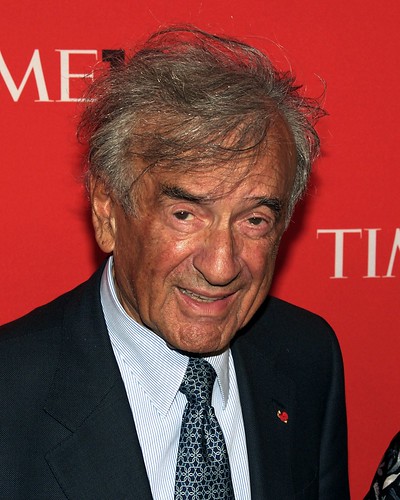
Image courtesy of David Shankbone's Flickr page - Elie Wiesel by David Shankbone 2010 NYC: https://www.flickr.com/photos/shankbone/4580129047/in/photolist-5TZD73-4pe43t-qcPkcW-4j7i2s-G3EvFP-7YJmNc-7jRx4i-63m3hq-bjRfA5-7jRyXg-7jRwAx-7jVsCL-7jRwRX-7jVsHy-qDK46-FGi8GQ-bqdv8f-bqdvJ7-6sCR7n-bD8qwR-rWPuwP-a55WCm-7Nx5Ur-AouNSV-4nRR8j-AQLihv-sJyYd-dGnTka-aD7iCo-95j49s-4oqXx7-q6oa1t-7bf6gN-95j5pN-95fZCn-95fZ7z-Hnoove-BpRujk-6aj737-rMySK7-srZ9Fy
Creative Commons License: https://creativecommons.org/licenses/by/2.0/
Elie Wisel died earlier today in Manhattan. He was 87 years old.
Born in Roumania and captured in Hungary during the Second World War, Wiesel was a survivor of the Auschwitz Concentration Camp during the Holocaust. There is a fairly famous picture of him in the bunks that was taken very shortly after the camp was liberated.
His writings have essentially urged people to never forget what happened in Europe in the 1940's during the Holocaust, and his life has been dedicated towards identifying and shedding light on oppression and imposed human suffering everywhere.
Wiesel's most famous work, "Night," is an account of his time at Auschwitz, although it is unconventional, as it is done in fictional form, despite it being mostly taken from his own personal experiences while at the infamous death camp.
Many of his over fifty books had to do with imposed human suffering, and how people respond to such things. He received numerous awards and distinctions, most notably the Nobel Peace Prize in 1986.
His writings brought the grim details of the Jewish experience at the death camps, and the hopelessness that they faced during the Holocaust. He understood the symbolism of the Auschwitz chimneys, which appeared to be the only relief that Jews could look forward to to alleviate their suffering.
I finally got to see Elie Wiesel in 2006, and the 92nd Street Y, in New York City. It was an honor to see him, and he spoke about the rumors that helped to trigger the massive anti-Semitism that itself was essential in bringing about the Holocaust. He ended this talk by asking a question: could he forgive those who had perpetrated the "Sons of Zion?"
"No." he replied simply, before walking off the stage.
Indeed, some things are too big, and too damaging, to simply forgive and forget. And he urged us to realize that the crimes of the Holocaust, crimes that he himself was victimized by and witnessed on an everyday basis, were among them.
On this day, we not only remember Elie Wiesel and his remarkable contributions to humanity, both in terms of his written work as well as his work to promote peace, but we also remember what he wanted us to never forget: the Holocaust.
RIP, Elie Wiesel.
No comments:
Post a Comment